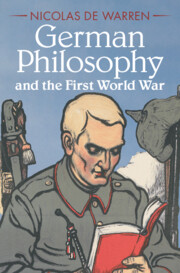51 results
Chapter 3 - I and Thou
-
- Book:
- German Philosophy and the First World War
- Published online:
- 30 March 2023
- Print publication:
- 20 April 2023, pp 83-114
-
- Chapter
- Export citation
Introduction
-
- Book:
- German Philosophy and the First World War
- Published online:
- 30 March 2023
- Print publication:
- 20 April 2023, pp 1-11
-
- Chapter
- Export citation
Chapter 4 - More than Life
-
- Book:
- German Philosophy and the First World War
- Published online:
- 30 March 2023
- Print publication:
- 20 April 2023, pp 115-152
-
- Chapter
- Export citation
Chapter 5 - The Apocalypse of Hope
-
- Book:
- German Philosophy and the First World War
- Published online:
- 30 March 2023
- Print publication:
- 20 April 2023, pp 153-185
-
- Chapter
- Export citation
Bibliography
-
- Book:
- German Philosophy and the First World War
- Published online:
- 30 March 2023
- Print publication:
- 20 April 2023, pp 401-419
-
- Chapter
- Export citation
Dedication
-
- Book:
- German Philosophy and the First World War
- Published online:
- 30 March 2023
- Print publication:
- 20 April 2023, pp v-vi
-
- Chapter
- Export citation
Chapter 8 - “A Journey around the World”
-
- Book:
- German Philosophy and the First World War
- Published online:
- 30 March 2023
- Print publication:
- 20 April 2023, pp 272-311
-
- Chapter
- Export citation
Chapter 2 - Deutschtum und Judentum
-
- Book:
- German Philosophy and the First World War
- Published online:
- 30 March 2023
- Print publication:
- 20 April 2023, pp 47-82
-
- Chapter
- Export citation
Chapter 10 - The Tragedy of the Person
-
- Book:
- German Philosophy and the First World War
- Published online:
- 30 March 2023
- Print publication:
- 20 April 2023, pp 367-400
-
- Chapter
- Export citation
Index
-
- Book:
- German Philosophy and the First World War
- Published online:
- 30 March 2023
- Print publication:
- 20 April 2023, pp 420-426
-
- Chapter
- Export citation
Contents
-
- Book:
- German Philosophy and the First World War
- Published online:
- 30 March 2023
- Print publication:
- 20 April 2023, pp vii-vii
-
- Chapter
- Export citation
Chapter 6 - The Road to Damascus in the Age of Capitalism
-
- Book:
- German Philosophy and the First World War
- Published online:
- 30 March 2023
- Print publication:
- 20 April 2023, pp 186-225
-
- Chapter
- Export citation
Chapter 7 - From Death into Life
-
- Book:
- German Philosophy and the First World War
- Published online:
- 30 March 2023
- Print publication:
- 20 April 2023, pp 226-271
-
- Chapter
- Export citation
Acknowledgments
-
- Book:
- German Philosophy and the First World War
- Published online:
- 30 March 2023
- Print publication:
- 20 April 2023, pp viii-viii
-
- Chapter
- Export citation
Chapter 1 - The Genius of War, the Genius of Peace
-
- Book:
- German Philosophy and the First World War
- Published online:
- 30 March 2023
- Print publication:
- 20 April 2023, pp 12-46
-
- Chapter
- Export citation
Copyright page
-
- Book:
- German Philosophy and the First World War
- Published online:
- 30 March 2023
- Print publication:
- 20 April 2023, pp iv-iv
-
- Chapter
- Export citation
Chapter 9 - Martin Heidegger and the Titanic Struggle over Being
-
- Book:
- German Philosophy and the First World War
- Published online:
- 30 March 2023
- Print publication:
- 20 April 2023, pp 312-366
-
- Chapter
- Export citation

German Philosophy and the First World War
-
- Published online:
- 30 March 2023
- Print publication:
- 20 April 2023
Chapter 6 - Spirit in the Age of Technical Production
- from Part I - Cassirer’s Philosophy of Culture
-
-
- Book:
- Interpreting Cassirer
- Published online:
- 17 April 2021
- Print publication:
- 01 April 2021, pp 109-129
-
- Chapter
- Export citation
4 - Husserl, Common Sense, and the Natural Attitude
- from Part I
-
-
- Book:
- The Cambridge Companion to Common-Sense Philosophy
- Published online:
- 06 November 2020
- Print publication:
- 19 November 2020, pp 86-111
-
- Chapter
- Export citation



